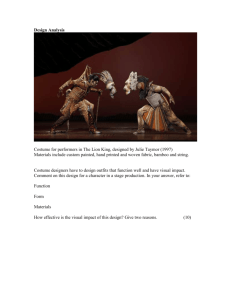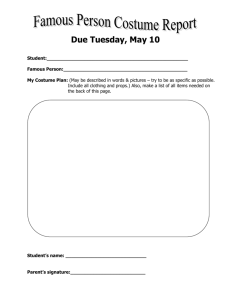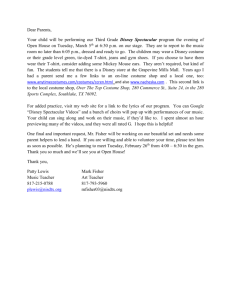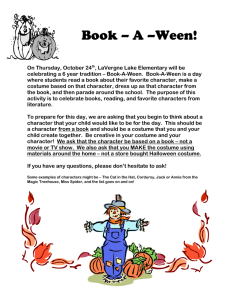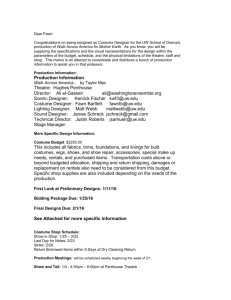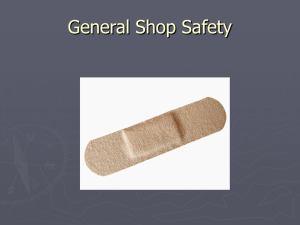Student Handbook THEATRE Safety Procedures, Regulations
advertisement
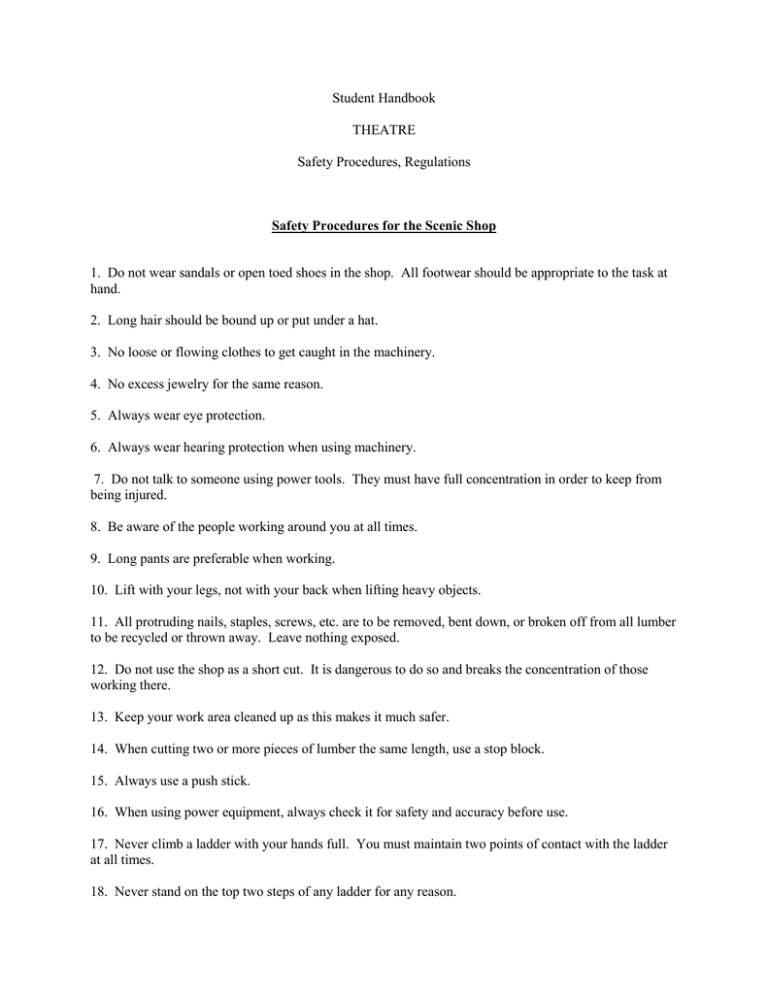
Student Handbook THEATRE Safety Procedures, Regulations Safety Procedures for the Scenic Shop 1. Do not wear sandals or open toed shoes in the shop. All footwear should be appropriate to the task at hand. 2. Long hair should be bound up or put under a hat. 3. No loose or flowing clothes to get caught in the machinery. 4. No excess jewelry for the same reason. 5. Always wear eye protection. 6. Always wear hearing protection when using machinery. 7. Do not talk to someone using power tools. They must have full concentration in order to keep from being injured. 8. Be aware of the people working around you at all times. 9. Long pants are preferable when working. 10. Lift with your legs, not with your back when lifting heavy objects. 11. All protruding nails, staples, screws, etc. are to be removed, bent down, or broken off from all lumber to be recycled or thrown away. Leave nothing exposed. 12. Do not use the shop as a short cut. It is dangerous to do so and breaks the concentration of those working there. 13. Keep your work area cleaned up as this makes it much safer. 14. When cutting two or more pieces of lumber the same length, use a stop block. 15. Always use a push stick. 16. When using power equipment, always check it for safety and accuracy before use. 17. Never climb a ladder with your hands full. You must maintain two points of contact with the ladder at all times. 18. Never stand on the top two steps of any ladder for any reason. 19. Never climb an extension ladder without it being secured either at the top or bottom so that it cannot slip. 20. Always work in pairs whenever possible in order that there may be a second set of hands to hold or someone to help in an emergency. 21. Never leave anything sitting on the top of a ladder. From the ground the item cannot be seen and it will fall off if the ladder is moved. 22. Never throw anything to a person on a ladder or drop anything from a ladder. 23. Any power cables that need to be used should be routed in the simplest and safest manner and immediately taken up when no longer needed. 24. Any item or situation that appears unsafe should be reported to the Technical Director or person in charge at that location immediately. 25. Know where the fire extinguishers, fire alarms, and fire exits are at all times. 26. Know where the eye wash station is located and how it operates. 27. Know where the first aid kit is located and who in the shop has experience in first aid.. 28. Know where the shop emergency telephone is located. Dial 911 in case of emergency. 29. Any accident that occurs, whether it results in injury or not is to be immediately reported to the Technical Director of his/her representative. 30. Any and all injuries that occur must be reported at the time of occurrence and dealt with. If it is a minor injury, the student will be allowed to treat it themselves or go to Health Services for aid. If it is determined to be more than minor by the shop supervisor, the student will report to Health Services for treatment before being allowed to return to the shop. All injuries that require attention will require a written Injury Report Form to be filled out and kept on file in the Scenic Shop. 31. Use the proper knots when rigging with rope. If you do not know the proper knots, we will be more than willing to teach them to you. 32. No alkyd or oil based paints or stains are to be used except under the direct supervision of the Technical Director or his approved representative. 33. Filtration masks are required when spray application of any paint finish is used. 34. The fireproof roll-up door between the carpentry and welding portions of the shop is to be kept closed at any time that welding and metal work is going on. Do not look at welding without the proper protective gear. You can lose your eyesight. 35. Proper ventilation is a must. Utilize the proper dust collection or fume ventilation system that is necessary for the task that you are performing. If you do not know what system to use, ask either the Technical Director or his representative for the proper instruction in its use. 36. No one attempts to use the electric welding or oxy/acetylene equipment in the welding shop without first being checked out by the Technical Director and approved for use. 37. All flammable materials, alkyd and oil paints, paint thinners, alcohol, and other possible hazardous materials will be kept in the ventilated paint storage cabinet when not in use. The use of these materials is discouraged in this shop, but sometimes must be used for certain scenic effects. 38. Use the proper tool for the job. Do not attempt to “make do” with whatever is at hand. This is a sure recipe for disaster. 39. If working more than eight feet above ground or stage level, sufficient and approved safety harness or devices must be used. 40. If you do not know how to do something or what you are doing appears dangerous, STOP and ask someone in charge. If you do not know how to do something and you attempt it anyway, it probably is dangerous. Take time for instruction, reassignment, or for safeties to be put in place. We want no one injured. Electricity Never take electricity, electrical appliances, or lighting units for granted. Take the time to respect the use of electricity by following these guidelines: Before using any electrical equipment, examine all cables for breaks or cuts in the insulation. Do not use anything with a damaged or questionable cable. Do not let your body become grounded. Many factors can put at risk of becoming grounded. If you are grounded, it means you have the potential of becoming part of the electrical circuit and thus, open to having electricity pass through your body. This can be fatal. The following is a partial list of the serious risks on both stage and locations: wet feet wet hands wet or damp floor or ground wet lamps wet cables General Costume and Sewing Safety While sewing safely is primarily common sense, it is important to note potential areas where injuries CAN occur so that they can be prevented. Pins, Needles and Cutting tools are the most frequent cause of injuries in the costume shop. Because costume construction requires we press everything we sew at each step of the process as well as the use of steam to set seams, heating devices such as irons and steamers are also obvious sources for potential injury. 1. Read and follow safety instructions prior to operating any equipment. 2. Pay attention and keep your focus on the task at hand – this decreases the potential for injury and increases productivity 3. Be aware of the people working around you 4. Keep your work area clean and organized a. If you drop something –PICK IT UP b. Put away tools and materials not in use c. At the end of each work session store all materials and tools and clean your work area. 5. NO Bare feet – a puncture wound caused by stepping on a pin is painful at least, and potentially very dangerous if it breaks off in your foot 6. Notify costume shop manager or one of the assistants if you need assistance operating equipment (sewing machines, sergers, irons etc.) or if equipment is not operating properly 7. Damaged tools such as dull cutting blades, nicked scissors etc. should be reported to costume shop staff CUTTING 1. Use the right tool for the job. There are designated scissors, shears, or rotary cutters for cutting fabric. Fabric cutting implements should NEVER be used to cut wire, paper, or other craft materials. 2. Retract or close rotary blades and mat knives when not in use. Close blades of scissors and shears when not in use. 3. Cut away from your body and hands. 4. When cutting fabric, make certain fabric is without wrinkles and that there isn’t anything else under the fabric. HAND SEWING 1. Hand sewing needles are assigned for your exclusive use – do not share. Store on labeled needle card. 2. Use thimbles to minimize pricking finger tips. 3. Pins and needles should never be placed in your mouth. 4. Use a pin cushion. 5. Be aware of your “arm span or reach” so you don’t risk impaling the person next to you with your needle. MACHINE SEWING 1. Keep fingers away from needle and presser foot when machine is in motion 2. When changing needles, make sure your feet are not in contact with foot control or disconnect the power supply 3. Don’t sew over pins. If the needle hits the pin the needle can break and pieces fly up into your face. If a needle hits a pin - one or both will bend or break – slowing down your work and potentially injuring you and/or damaging equipment 4. Use a pin cushion – a pile of loose pins next to the machine is an injury waiting to happen. 5. Turn off machine when not in use. SHARPS – 1. Dispose of bent or broken pins, needles, and blades in container labeled SHARPS. Do NOT put in trash as they will puncture the bag and are a potential source for injury. 2. If you prick or cut your finger and draw blood – take care of the wound first. Notify Shop Staff immediately if you need assistance, or if injury requires more than a Band-Aid. An injury report will need to be filled out. 3. Cleanup for any injury that draws blood: a. Clean the implement with alcohol or diluted bleach solution. b. If implement is damaged – dispose of in RED BIOHAZARD box c. Clean hard surfaces with alcohol or bleach solution. d. Shop Staff will need to determine best method to safely remove blood from costume fabric or padded surfaces. Notify them immediately. PRESSING/STEAMING 1. Assume that the iron is hot - don't touch the iron with your fingers 2. We use industrial irons and steamers so the water is VERY hot. Be aware of the direction of the steam and point it away from you. 3. Unplug steamers and the irons at the end of the work day. Costume Shop Rental and Loans The primary purpose of the costume shop and costume personnel is to support the production needs of the School of Stage & Screen. While priority is given to the events designated as part of the annual “season’s calendar” we also serve as a resource for the university, for our community and the region as advocates of the arts. As a state supported entity the costume shop does not engage in activities that could be construed as being in competition with commercial costume shops – we do not loan or rent costumes for student parties or to individuals. We have reciprocal loan agreements with other educational and nonprofit theatres and related venues, but support to other events and entities is limited depending on available time and resources. COSTUME FACILITIES Costume Shop serves dual functions as both a teaching laboratory/classroom and as a construction facility for the creation and modification of costumes for theatre, film & television, and dance productions. The shop is located on the first floor of the Bardo Performing Arts Center (BAC 182) adjacent to the Scene Shop. The shop is available on a very limited basis for student use, for preparation of student productions. All work must be scheduled through the Costume Shop Manager as coordinator of the master calendar for all costume shop activities. Contact: Tony Sirk, 828-227-3848. Costume Storage is located in several areas. Primary storage is on the second floor of BAC. Additional storage including storage for uniforms and formal wear is located in Stillwell on the second floor. COSTUME LOANS/RENTALS - POLICY AND PROCEDURE Borrowing/renting costumes Costumes are available for student assignments and productions with sufficient notice. Assessing any costume needs should be part of all pre-production planning for student productions as any activities must be worked into the shops production calendar. Primary stock will be reserved for main-stage productions only. Any exceptions to this will be dealt with on a case-by-case basis Student Productions: Inform the Costume Shop Manager - Tony Sirk: 227-3848. ajsirk@email.wcu.edu) of your production schedule NEED DEAD DATES FOR NOTICE TO Tony – 2 WEEKS PRIOR. Schedule an appointment with Manager a minimum of one-week in advance to discuss your needs. Shop hours are posted at the BAC entrance. Provide (via email) a detailed list of your needs and appropriate measurements of performers– at least one week in advance of checkout. All items must be returned in good condition at the scheduled time/place and may be checked in by authorized costume shop personnel only. SENIOR THESIS PROJECTS Any wardrobe issues should be presented to the Costume Shop Manager as soon as there is a first draft script. All items will be signed out by authorized costume shop personnel only and may only be checked out with a permission form from your instructor. The specifics of cleaning, etc. will be discussed at check-out. If items are to be cleaned after use, we will take care of that and bill your unit. There will be a minimum re-stock fee assessed: o $10.00 up to 4 items o $15.00 5- 10 items per check-out The “costume closet” (Stillwell). Faculty and staff have set aside a selection of garments stored in the “costume closet” which may be borrowed for use in class or for student productions. These must be cleaned/laundered prior to return. It is important that you keep this area clean and that garments are properly restocked – otherwise you will lose access to this as a resource. Contact: Tony Sirk, 828-2273848 (costume shop) to arrange access to the “closet.” SEE Crew Head and general guidelines for crews, as well as forms for course credit for crews
